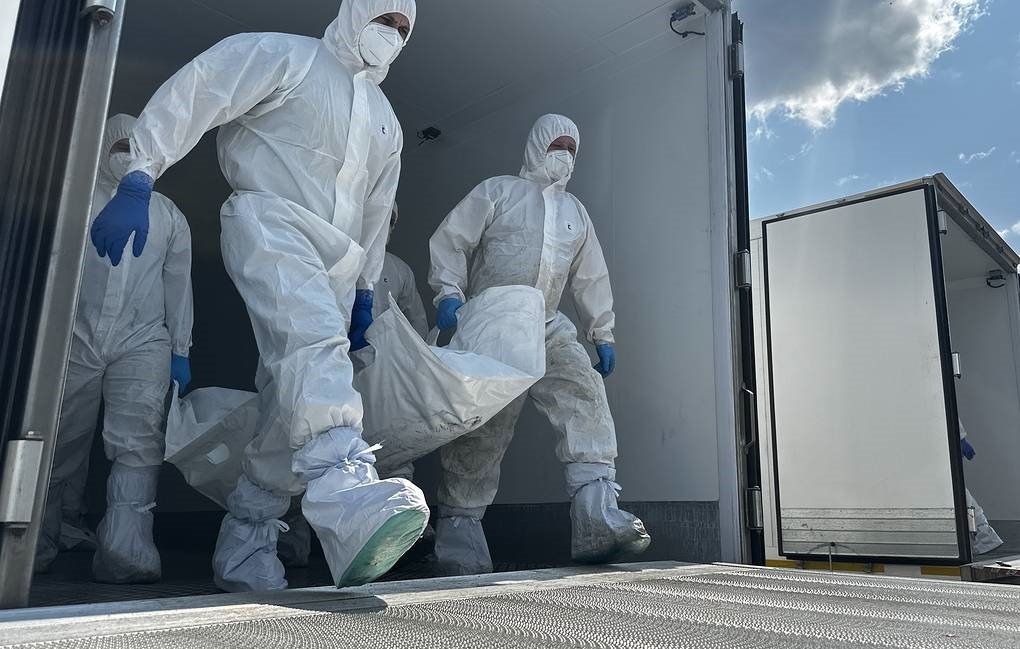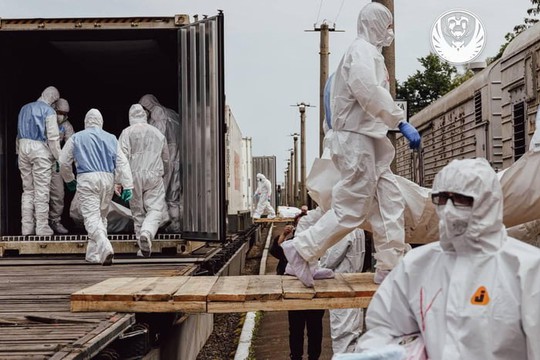A spat over the return of 6,000 Ukrainian bodies lays bare the unforgiving economic and political challenge that Ukraine faces in bringing home its fallen, and the political storm that Zelensky will face when the war finally ends, ‘The Responsible Statecraft’ writes.
The second round of the Istanbul peace talks on June 2 led to an agreement for Russia and Ukraine to exchange 6,000 bodies. On Sunday, June 8, a convoy of Russian refrigerated lorries arrived at the agreed meeting point in Belarus, with over 1,000 bodies, but the Ukrainian side did not show up.
Ukraine’s challenge is greater by many magnitudes; it will take years, not months, to identify every fallen Ukrainian service man and woman. The victim identification process for the 3,000 western tourists killed in Thailand in 2004 took well over a year.
It’s clear from the Russian negotiator’s statement that not all of the 6,000 bodies due for exchange have identifying documents, such as dog tags.
In October 2024, the Economist revealed that Ukraine’s Commissioner of Missing Persons had a list of over 48,000 who are still missing together with 2,552 bodies that had yet to be identified. Those numbers will be higher today, eight months down the track.
Some commentators have seized on the enormous cost in compensation to the families of the deceased. There have been widespread social media posts that Ukraine will have to pay around $2.1 billion in compensation to the families of the 6,000, but this figure is, in fact, too low. Ukraine’s Cabinet of Ministers agreed in September 2024 to increase the one-off payment to the families of the fallen to around $544,000. So the compensation figure for the 6,000 soldiers will run to $3.6 billion in an already overstretched Ukrainian state budget which is being subsidized by western nations. And this marks just the tip of the iceberg.
Even if the war were to end today, Ukraine could be staring down the barrel of a compensation bill, even on a conservative estimate, of over $130 billion. To put that into context, Ukraine is expected to generate $48.2 billion in tax revenue in 2025. Anyone who believes that Ukraine will not ask western donor nations for support in meeting this bill is fooling no one but themselves.
In a bid to encourage men to fight, the most junior soldiers in the firing line are paid well over ten times the average salary in Ukraine. That includes a basic salary of almost $4,593 per month for troops on the front line, and all troops receive a payment of around $1,700 for every cumulative 30 days spent in combat. The latter sum also, terrifyingly, talks to the short life expectancy of those on the front line. Early in 2023, a former U.S. Marine claimed that the average life expectancy for recruits on the frontline was four hours. And, of course, extremely high rates of pay while war rages pose a major political challenge when the fighting stops and front-line soldiers take a near 89% reduction to non-combat pay of $494 per month.
Some commentators have argued that Ukraine might be incentivized to slow the identification of bodies to delay payments to relatives. That is an oversimplification that misses the true scale of the task that Ukraine faces.
The living nightmare for heartbroken relatives waiting to lay their loved ones to rest seems certain to continue for years to come. This may impose a devastating political cost on Zelensky far greater than the towering and unaffordable economic cost of fighting a losing war.
 Photo: TASS
Photo: TASS
MOSCOW, June 16. /TASS/. Russia has fulfilled its commitments under the Istanbul agreements and has handed over to the Ukrainian side a total of 6,060 bodies of Ukrainian servicemen, Russian Presidential Aide and chief negotiator at the talks with the Ukrainian side, Vladimir Medinsky, said. He also confirmed the ongoing prisoner exchanges between the sides.
TASS gathered key information about the exchanges.
Repatriation of remains
- Russia has handed over to the Ukrainian side 6,060 bodies of Ukrainian servicemen, Medinsky said.
- In return, Ukraine has returned the bodies of 78 fallen Russian servicemen.
- The Russian Defense Ministry said that Moscow is ready to hand over an additional 2,239 Ukrainian soldiers’ bodies to Kiev.
Prisoner exchanges
- Russia and Ukraine continue with prisoners of war swaps and have also arranged sanitary exchanges of severely wounded persons, Medinsky noted.
Agreements and execution
- Medinsky stated that on June 6 Russia began implementing the humanitarian agreements reached during talks in Istanbul, initiating the transfer of the bodies of over 6,000 Ukrainian troops to Kiev alongside exchanges of the wounded and seriously ill prisoners of war, as well as soldiers under 25.
- However, Ukraine suddenly moved to indefinitely postpone accepting the bodies.
- The process eventually resumed on June 11.
- On June 9, 10, 12 and 14, four groups of Russian servicemen returned home from Ukrainian territory, while Russia released the respective numbers of Ukrainian troops.
read more in our Telegram-channel https://t.me/The_International_Affairs

 11:28 18.06.2025 •
11:28 18.06.2025 •























